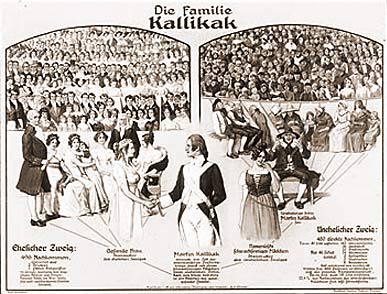German educational slide explaining the Kallikak family, 1924

"Feeblemindedness," a catch-all mental illness characterized mainly by low scores on intelligence tests and supposed promiscuity, was a major concern of eugenicists. This owed much to Henry Goddard's influential book, The Kallikaks (1912), an effectively related study of Martin Kallikak, whose marriage to a Quaker woman produced a good lineage (kallos for "beauty"). Martin's dalliance with an attractive, but feebleminded, barmaid produced a second, dysgenic lineage (kakos for "bad"). Goddard hypothesized that feeblemindedness was caused by a recessive gene, which would be spread throughout the national germ plasm by the supposedly promiscuous behavior of feebleminded persons. (DNAi location: Chronicle > Threat of the Unfit > Threats)
germ plasm,quaker woman,kallikak family,educational slide,intelligence tests,promiscuous behavior,kakos,recessive gene,kallos,dnai,dalliance,barmaid,goddard,lineage,mental illness,kallikaks,marriage
- ID: 15767
- Source: DNALC.DNAi
Related Content
15444. How science was misused to support eugenics, James Watson
James Watson how science was misused to support eugenics.
15440. Eugenics and mental institutions in the early 1900's - James Watson
James Watson talks about eugenics and mental institutions in the early 1900's.
15437. How the eugenists viewed the people they discriminated against, James Watson
James Watson talks about Eugenicists were concerned about the increasing cost of caring for the feebleminded, because they were thought to reproduce more quickly than normal individuals.
15433. Eugenics, race discrimination, and anti-immigration laws in the United States, James Watson
James Watson talks about eugenics, race discrimination, and anti-immigration laws in the United States.
15813. Deborah Kallikak
Deborah Kallikak, a "feebleminded" individual in an Institution in New Jersey. From The Kallikak Family: A Study in the Heredity of Feeble-Mindedness by H.H. Goddard, 1913.
15811. Deborah Kallikak sewing
Deborah Kallikak, a "feebleminded" individual learning to sew. From The Kallikak Family: A Study in the Heredity of Feeble-Mindedness by H.H. Goddard, 1913.
15376. Drawing family pedigrees for manic depression, Kay Jamison
Kay Jamison discusses her family pedigree, which is similar to the Kallikak pedigree.
15816. Kallikak family members
Kallikak family membersâ the "defective" branch. From The Kallikak Family: A Study in the Heredity of Feeble-Mindedness by H.H. Goddard, 1913. Source: University at Albany, State University of New York.
15725. Deborah Kallikak and pedigree montage
Deborah Kallikak was studied by eugenicists as a "feebleminded" individual in an Institution in New Jersey.
15815. Deborah Kallikak's handiwork
Deborah Kallikak's handiwork during her time at the Traning School at Vineland, New Jersey. From The Kallikak Family: A Study in the Heredity of Feeble-Mindedness by H.H. Goddard, 1913. Source: University at Albany, State University of New York.












